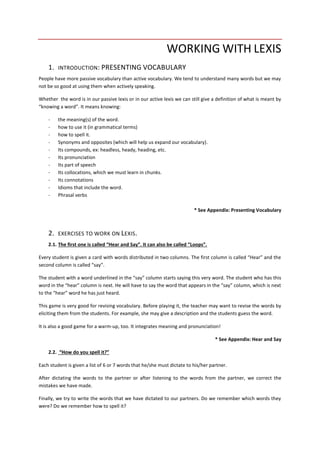
Working lexis
- 1. WORKING WITH LEXIS 1. INTRODUCTION : PRESENTING VOCABULARY People have more passive vocabulary than active vocabulary. We tend to understand many words but we may not be so good at using them when actively speaking. Whether the word is in our passive lexis or in our active lexis we can still give a definition of what is meant by “knowing a word”. It means knowing: - the meaning(s) of the word. - how to use it (in grammatical terms) - how to spell it. - Synonyms and opposites (which will help us expand our vocabulary). - Its compounds, ex: headless, heady, heading, etc. - Its pronunciation - Its part of speech - Its collocations, which we must learn in chunks. - Its connotations - Idioms that include the word. - Phrasal verbs * See Appendix: Presenting Vocabulary 2. EXERCISES TO WORK ON LEXIS. 2.1. The first one is called “Hear and Say”. It can also be called “Loops”. Every student is given a card with words distributed in two columns. The first column is called “Hear” and the second column is called “say”. The student with a word underlined in the “say” column starts saying this very word. The student who has this word in the “hear” column is next. He will have to say the word that appears in the “say” column, which is next to the “hear” word he has just heard. This game is very good for revising vocabulary. Before playing it, the teacher may want to revise the words by eliciting them from the students. For example, she may give a description and the students guess the word. It is also a good game for a warm-up, too. It integrates meaning and pronunciation! * See Appendix: Hear and Say 2.2. “How do you spell it?” Each student is given a list of 6 or 7 words that he/she must dictate to his/her partner. After dictating the words to the partner or after listening to the words from the partner, we correct the mistakes we have made. Finally, we try to write the words that we have dictated to our partners. Do we remember which words they were? Do we remember how to spell it?
- 2. * See Appendix: How do you spell it? 2.3. DOMINOES: words + definitions or words + pictures or pictures + definitions, etc. Dominoes are a great way to introduce or revise vocabulary with your students! You can create your own dominoes in http://www.toolsforeducators.com/dominoes/. 2.4. QUESTION LOOPS: They are great fun and very easy to create! You can use them for any topic and it can be questions + answer or word + definitions, etc. You can play it once and then the second time you must ask the students to do it quicklier. Then, you can collect the cards and redistribute them to make it quicker too. * See Appendix: Question Loops 2.5. TRIANGLE PUZZLE: Collaborative game in pairs. Students must work the puzzle out it could be with opposites, past-present, collocations, phrasal verbs, etc. * See Appendix: Triangle Game
- 3. 2.6. LUDO GAME and BLOCKBUSTERS Students have a dice, a blockbuster board and a word cloud with words you would like to reivse on different topics (let’s say subjects!) and you give them this clue or any other: 1. ICT 2. Religion 3. Business 4. hard science 5. natural science 6. pass If you define one word correctly, you can move one space. The winner is the one who is able to move to the other side first. * See Appendix: Ludo and Blockbuster 2.7. PICK UP A CARD Pick up a card from a pile of cards the teacher has given you and define it. 2.8. CARDS TO MATCH With synonyms but they are grades. Ex. Good – brilliant, funny – hilarious, etc. Then, put them faced down and play a memory game! In English it is called PELMANISM-MEMORY 2.9. Right Question, Right Answer * See Appendix: Right Question, Right Answer 2.10. IDIOMS * See Appendix: Colour Idioms.